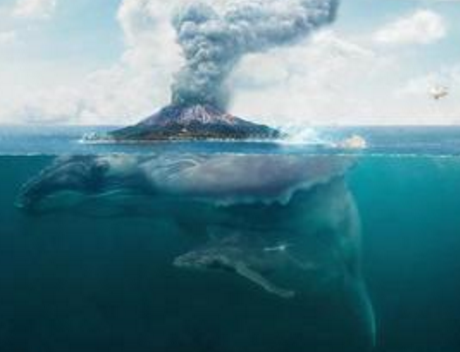
Can volcanoes only be on land? No, there are also underwater volcanoes whose occurrence exists in deep water bodies as well as shallow water bodies. There are 5,000 or more active underwater volcanoes that have been put on the record. And the biggest underwater volcano that is still active today is the Kolumbo in the Aegean Sea in Santorini island, Greece, whose last eruption happened in 1650.
Underwater volcanic eruption is the same as that which happens on land. However, the intensity with which the eruption occurs varies variably and is milder in case of underwater volcanoes. Volcanic eruptions in shallow waters shoot rocky debris(碎片), lava(熔岩), and other volcanic material high above the surface of the seas, while volcanic eruptions in deep water bodies don’t shoot the rocky debris and lava in an explosion. In case of large underwater volcanic eruptions, the lava that erupts, solidifies(凝固) immediately after it contacts the water around. These eruptions go on accumulating vertically and become so huge that they might form volcanic islands.
In a land volcano, the liquid lava that erupts reacts actively with the air, changes to gas, and later solidifies. Continuous eruptions like these form layers and cause the formation of huge mountains. In an underwater volcano, the lava that erupts moves in an upward direction. The water has a cooling effect on this liquid lava which causes it to solidify rapidly; so underwater volcanoes are higher than surface volcanoes.
For almost 25 years now, scientists have tried to capture an underwater volcanic eruption on camera and have finally succeeded in doing so. It’s their belief that analyzing underwater volcanoes further will give them a clear insight into: the ways of life and adaptation styles in such extreme conditions; how heat travels from inside the Earth to its surface; and so on.
The Earth is an amazing planet, which never stops surprising us. Although scientists may believe the causes, formation, and volcano-prone regions(火山易发地区) of underwater volcanoes have been thoroughly evaluated, many unexplained phenomena still need to be gauged.
1.How does the passage lead in its topic?
A By giving an example.
B By giving some data.
C By listing some facts.
D By asking and answering a question.
解析:选D。D 推理判断题。根据第一段Can volcanoes only be on land? No, there are also underwater volcanoes whose occurrence exists in deep water bodies as well as shallow water bodies.可知文章是通过提出并回答一个问题导入话题的,故选D。
2.Compared with land volcanic eruption, the eruptions of underwater volcanoes tend to be _________.
A less active
B lower
C less intensive
D less frequent
解析:选C。C 细节理解题。根据第二段However, the intensity with which the eruption occurs varies variably and is milder in case of underwater volcanoes.可知水下的火山爆发相对要弱一些,故选C。
3.What can we learn from the second paragraph?
A The formation of volcanic islands.
B The harms of volcanic eruptions.
C The process of a volcanic eruption on land.
D The similarities between volcanic eruptions.
解析:选A。A 细节理解题。根据第二段These eruptions go on accumulating vertically and become so huge that they might form volcanic islands.可知从该段我们可以了解到火山岛的成因,故选A。
4.In scientists’ opinion, underwater volcanoes _________.
A are fully understood
B can be controlled soon
C are really worth studying
D are easy to photograph
解析:选C。C 推理判断题。根据第四段第二句可知,科学家们认为进一步研究水下火山可使他们清楚地了解生物在这种极端条件下的生活和适应方式;热量如何从地球内部传递到地表;等等。由此可推断科学家认为水下火山是很有研究价值的,故选C。